|
|
|
Sort Order |
|
|
|
Items / Page
|
|
|
|
|
|
|
| Srl | Item |
| 1 |
ID:
178699
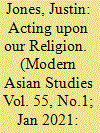

|
|
|
|
|
| Summary/Abstract |
In the last 15 years, India has witnessed the expression of a variety of new non-conformist religious practices performed by Muslim women. A range of vibrant campaigns has been pioneered by Muslim women's associations, asserting women's claims to hold and lead congregational prayers, enter and manage mosques, visit shrines, officiate Muslim marriages, and issue shari‘ah-based legal decisions. This article explores the twin questions of why these experimental remodellings of women's Islamic observance and leadership have been so pronounced in the Indian context compared with much of the Islamic world, and furthermore, why Muslim women's rights activists have put such confessional matters at the centre of their work. Exploring a series of specific female-led assertions of religious agency centring upon mosques, shari‘ah councils, and a Sufi shrine, the article argues that India's variant of ‘secularism’, which has normalized the state's non-intervention in religious institutions and laws, has given women the freedom to embark upon overhauls of Islamic conventions denied to their counterparts elsewhere. Simultaneously, this same framework for handling religious questions has historically given intra-community and clerical voices particular influence in regulating Muslim community affairs and family laws, compelling activists to seek women's empowerment in individual and local community contexts to further their objectives, including through the assertion of experimental forms of religious conduct.
|
|
|
|
|
|
|
|
|
|
|
|
|
|
|
|
| 2 |
ID:
174423
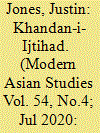

|
|
|
|
|
| Summary/Abstract |
Revisiting the debate on how Islam's ‘learned men’ (‘ulama) have sustained their religious authority through changing historical circumstances, this article offers a longue durée account of the so-called ‘Khandan-i-Ijtihad’: a family of renowned scholars and jurists who have held scholarly and popular precedence within South Asia's Shi‘i clerical networks for some 250 years. Instead of analysing the ‘ulama as a corporate group or a class of religious professionals, this article examines the ‘ulama as members of households (khandan, khanwadah) and emphasizes the important role of family lineage and inherited social influence as conduits of clerical leadership. Tracing both the genealogical succession and the vocational enterprises of this family over several generations, the article proposes a framework for understanding an individual scholar's relationship with the collective household, arguing that a cleric's own reputation (hasab-va-nasab) rests on a mingling of ancestral pedigree and personal achievement, with the stature of individual and household perpetually affirming and reinforcing each other in the making of Islamic clerical authority. Furthermore, the article establishes the importance of the ‘ulama-biography (tazkirah) as itself a mechanism for actively sustaining the relevance of contemporary ‘ulama, by perpetually memorializing their ancestors.
|
|
|
|
|
|
|
|
|
|
|
|
|
|
|
|
| 3 |
ID:
089881
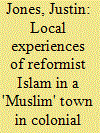

|
|
|
|
|
| Publication |
2009.
|
| Summary/Abstract |
This paper discusses shifts within Islamic life, ritual and practice in the town of Amroha in the United Provinces of India, during the eventful period of approximately 1860-1930. Based primarily upon Urdu writings produced about or by Muslim residents of the town during this period, it examines the ways in which wider religious reformist movements such as those associated with Aligarh, Deoband and Bareilly were received and experienced within nearby smaller, supposedly marginal urban settlements. The paper argues that broader currents of religious reform were not unquestioningly accepted in Amroha, but were often engaged in a constant process of dialogue and accommodation with local particularities. The first section introduces Amroha and its sharif Muslim population, focusing upon how the town's Islamic identity was defined and described. The second section examines a plethora of public religious rites and institutions emerging during this period, including madrasas and imambaras, discussing how these were used by eminent local families to reinforce distinctly local hierarchies and cultural particularities. A third section considers public debates in Amroha concerning the Aligarh movement, arguing that these debates enhanced local rivalries, especially those between Shia and Sunni Muslims. A final section interrogates the growing culture of religious disputation in the town, suggesting that such debate facilitated the negotiation of religious change in a transitory social environment
|
|
|
|
|
|
|
|
|
|
|
|
|
|
|
|
| 4 |
ID:
090304
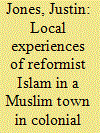

|
|
|
|
|
| Publication |
2009.
|
| Summary/Abstract |
This paper discusses shifts within Islamic life, ritual and practice in the town of Amroha in the United Provinces of India, during the eventful period of approximately 1860-1930. Based primarily upon Urdu writings produced about or by Muslim residents of the town during this period, it examines the ways in which wider religious reformist movements such as those associated with Aligarh, Deoband and Bareilly were received and experienced within nearby smaller, supposedly marginal urban settlements. The paper argues that broader currents of religious reform were not unquestioningly accepted in Amroha, but were often engaged in a constant process of dialogue and accommodation with local particularities. The first section introduces Amroha and its sharif Muslim population, focusing upon how the town's Islamic identity was defined and described. The second section examines a plethora of public religious rites and institutions emerging during this period, including madrasas and imambaras, discussing how these were used by eminent local families to reinforce distinctly local hierarchies and cultural particularities. A third section considers public debates in Amroha concerning the Aligarh movement, arguing that these debates enhanced local rivalries, especially those between Shia and Sunni Muslims. A final section interrogates the growing culture of religious disputation in the town, suggesting that such debate facilitated the negotiation of religious change in a transitory social environment.
|
|
|
|
|
|
|
|
|
|
|
|
|
|
|
|
| 5 |
ID:
099261
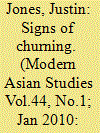

|
|
|
|
|
| Publication |
2010,
|
| Summary/Abstract |
For many Muslims, the preservation of Muslim Personal Law has become the touchstone of their capacity to defend their religious identity in modern India. This paper examines public debate over Muslim Personal Law, not as a site of consensus within the community, but rather as an arena in which a varied array of Muslim individuals, schools and organisations have sought to assert their own distinctiveness. This is done by discussing the evolution of the All India Muslim Personal Law Board, the most influential organisation to speak on such matters since the 1970s, with particular focus on its recent disintegration at the hands of a number of alternative legal councils formed by feminist, clerical and other groups. These organisations have justified their existence through criticism of the organisation's alleged attempts to standardise Islamic law, and its perceived dominance by the Deobandi school of thought. In truth, however, this process of fragmentation results from a complex array of embryonic and interlinked personal, political and ideological competitions, indicative of the increasingly fraught process of consensus-building in contemporary Indian Muslim society.
|
|
|
|
|
|
|
|
|
|
|
|
|
|
|
|
| 6 |
ID:
171861
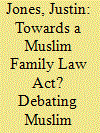

|
|
|
|
|
| Summary/Abstract |
Muslim personal laws in India have never been systematically codified, in marked contrast both to Hindu family laws in India and to Islamic family laws in much of the Muslim-majority world, both of which have been subject to a far greater degree of codification. This article examines the call being made by one prominent contemporary Muslim women's organisation, the Bharatiya Muslim Mahila Andolan (BMMA), for the wholesale codification of Muslim family laws in India as a pathway to protecting women's rights. Following a discussion of the wider context of India's uncodified Muslim personal law system, this paper offers a commentary on the BMMA's draft Family Law Act, first released in 2014. It demonstrates how this document synthesises discourses of women's rights drawn from a series of Qur’anic, constitutional and transnational reference points. By drawing from such diverse sources, and while legal codification in much of the Islamic world has instituted fundamentally patriarchal legal norms, the BMMA's proposed code articulates a distinctive, more gender-equal reading of Islamic family law.
|
|
|
|
|
|
|
|
|
|
|
|
|
|
|
|
|
|
|
|
|